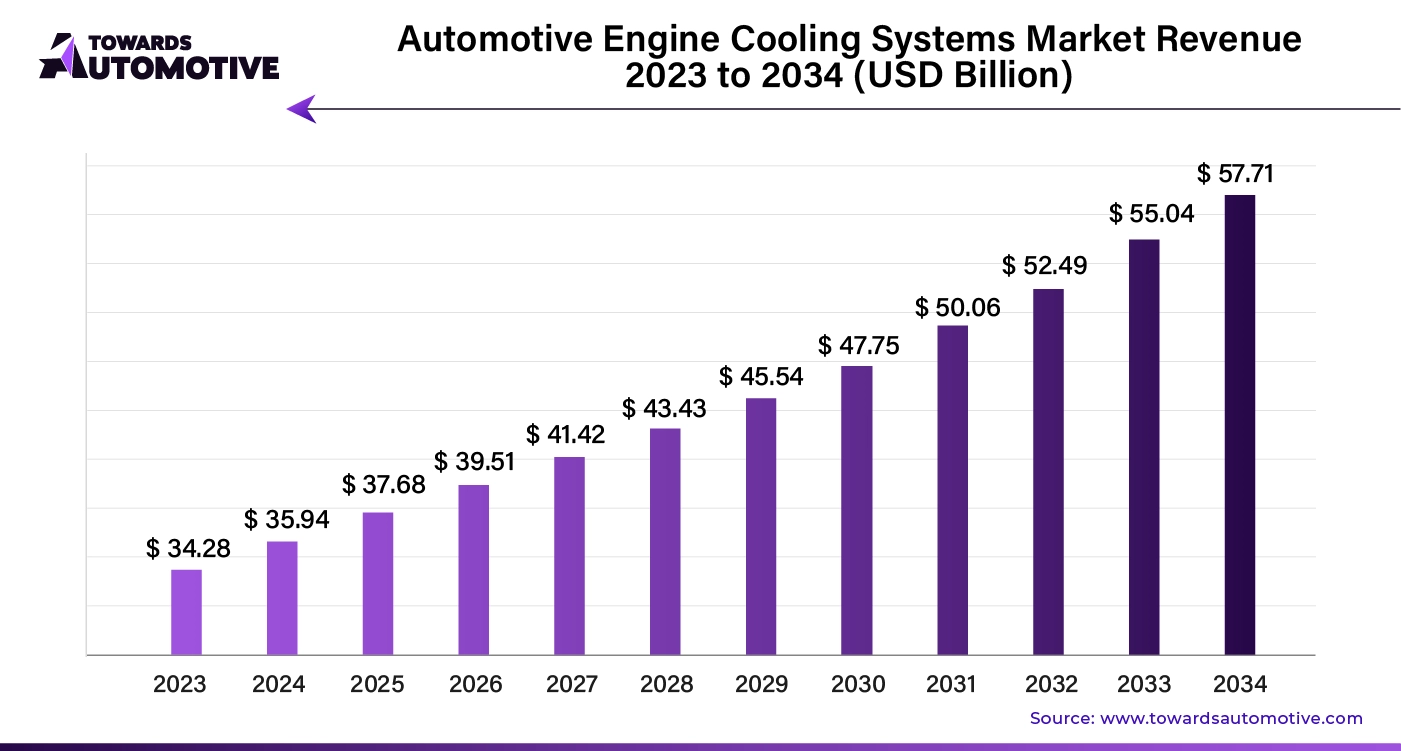The automotive industry is witnessing significant advancements in engine cooling technology, driven by the integration of sophisticated control systems. These advanced systems are transforming the way temperature management is handled in modern vehicles, enhancing both precision and efficiency. By leveraging real-time data from a range of sensors, advanced control systems optimize the operation of engine cooling components, ensuring that engines operate at their optimal temperatures and avoiding the risk of overheating.
The global automotive engine cooling systems market is currently valued at USD 35.94 billion in 2024 and is expected to grow to USD 57.71 billion by 2034, expanding at a CAGR of 4.85% during the forecast period. This growth reflects the rising demand for more efficient and advanced cooling solutions, especially as automotive engines become increasingly complex and performance-oriented.

Get All the Details in Our Solution – Download Brochure @ https://www.towardsautomotive.com/download-brochure/1460
Precision Temperature Management for Enhanced Performance
Modern automotive engines are designed to function under varying conditions, which means they require precise thermal management to maintain peak performance. Advanced control systems play a pivotal role in this process by continuously monitoring key engine parameters, including temperature, load, and speed. With the ability to analyze this data in real-time, these systems can dynamically adjust the cooling system’s operation, ensuring that the engine stays within its optimal temperature range.
This level of precision not only prevents overheating but also contributes to improved fuel efficiency and performance. As vehicles become more complex and their engines increasingly run at higher performance levels, the need for such advanced cooling solutions has become more critical, directly contributing to the market’s projected growth.
Integration with Other Vehicle Systems for Holistic Efficiency
One of the standout features of advanced control systems is their ability to seamlessly coordinate with other vehicle systems, such as air conditioning and powertrain components. This holistic approach ensures that the entire vehicle operates more efficiently, with various systems working in harmony to maintain overall performance. By integrating engine cooling with these other vehicle components, advanced control systems help to achieve a balance that enhances both vehicle efficiency and reliability.
In addition to maintaining optimal engine temperatures, these systems can adapt to the overall needs of the vehicle, adjusting performance based on factors such as driving conditions and external environmental factors. The result is a more efficient, reliable vehicle that delivers enhanced performance and better fuel economy.
The Future of Cooling Technology: AI-Powered Innovations
The future of engine cooling is being shaped by the integration of artificial intelligence (AI) into control systems. AI-powered systems offer even greater potential by enabling predictive maintenance. By continuously analyzing data from sensors, AI systems can detect potential issues before they lead to failure, enabling proactive interventions to prevent breakdowns and system malfunctions.
This innovation significantly enhances the reliability of cooling systems, reducing the risk of engine failure due to temperature regulation issues. As AI continues to evolve, the potential for more intelligent, self-adjusting control systems becomes even greater, paving the way for cutting-edge cooling solutions that are both smarter and more efficient.
Stellantis CustomFit: A Game-Changer in Commercial Vehicle Cooling
A notable development in this field came in September 2024, when Stellantis launched its Stellantis CustomFit system. This advanced control system is specifically designed to enhance engine cooling efficiency in commercial vehicles, which face unique challenges due to the demanding nature of their operations. By incorporating customizable control options, Stellantis CustomFit ensures that commercial vehicles maintain optimal cooling performance regardless of the driving conditions they encounter.
The launch of this system marks an important milestone in the automotive engine cooling market, showcasing how advanced control systems can be tailored to meet the specific needs of different vehicle categories, from passenger cars to heavy-duty trucks.
Opportunities for Market Growth
As automotive technology continues to evolve, the adoption of advanced control systems is becoming increasingly essential. These systems are at the forefront of delivering next-generation cooling solutions that meet the rising demands of modern vehicles. With the automotive engine cooling systems market expected to grow from USD 35.94 billion in 2024 to USD 57.71 billion by 2034, the market is poised for expansion, fueled by innovations in engine cooling technology.
Invest in Our Premium Strategic Solution @ https://www.towardsautomotive.com/price/1460
You can place an order or ask any questions, please feel free to contact us at sales@towardsautomotive.com
Explore the comprehensive statistics and insights on automotive industry data and its associated segmentation: Get a Subscription
For Latest Update Follow Us: https://www.linkedin.com/company/towards-automotive
